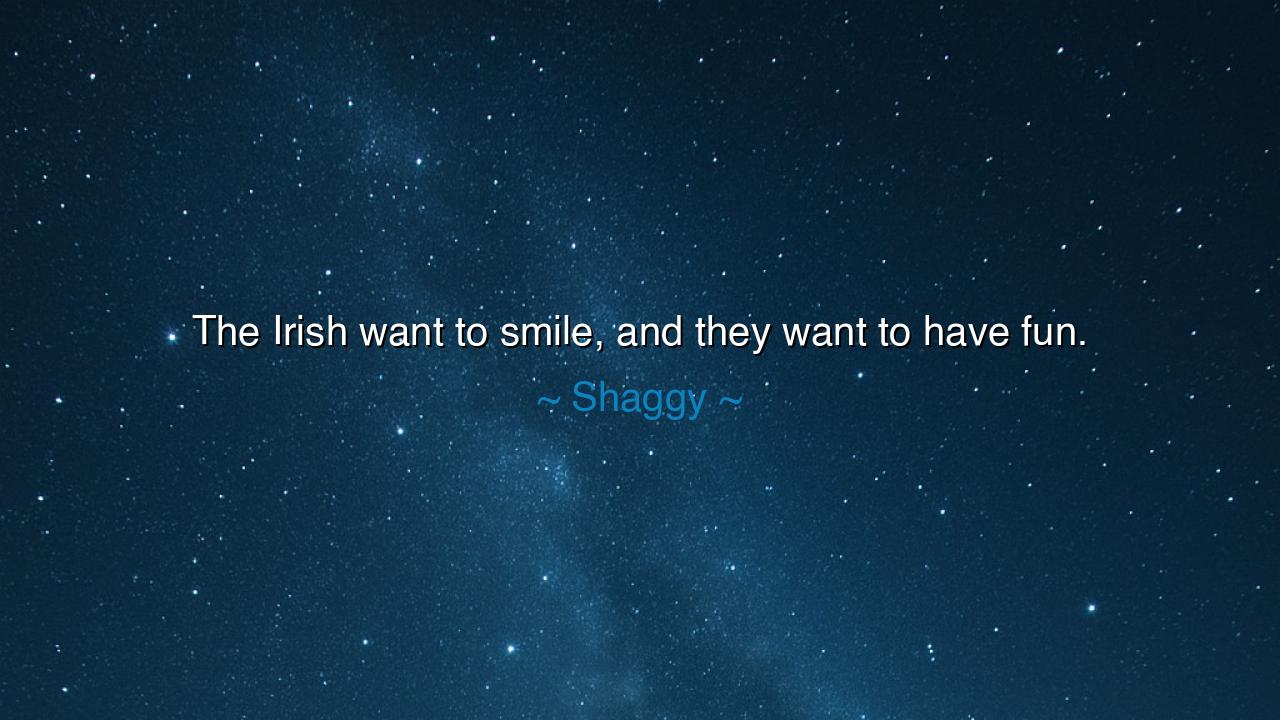
The Irish want to smile, and they want to have fun.






The words of Shaggy, “The Irish want to smile, and they want to have fun,” may seem light as laughter, yet they carry within them a truth of deep and ancient strength. For to smile in the face of hardship, and to seek joy amidst trials, is no small thing. It is the mark of a people who have known sorrow yet refused to be conquered by it. The heart of Ireland, forged in centuries of struggle, learned not only how to endure, but how to sing, to dance, and to find delight even in the shadow of suffering.
For what is a smile but defiance against despair? To grin when the world presses heavy upon the shoulders is an act of quiet heroism. The Irish, through famine, through exile, through oppression, held fast to this secret power. When all else was stripped away, their spirit yet burned. The laughter in their pubs, the songs by their fires, the dances upon their green hills—these were not mere entertainments, but acts of resistance, a declaration that life itself would not be crushed.
History gives us many witnesses to this truth. Consider the great poet W. B. Yeats, who wrote of Ireland’s dreams during a time of political turmoil. Though the land was scarred by division and blood, his verses sang of beauty, of myth, of the eternal longing of the human soul. In weaving together pain and wonder, Yeats embodied the Irish gift: to turn even sorrow into a song, to find fun and brightness where others would see only gloom. His work reminds us that joy is not the absence of suffering, but the power to transform it.
To say, then, that the Irish “want to have fun” is not to reduce them to frivolity, but to honor their resilience. Fun is not shallow when born of such depth. It becomes a celebration of survival, a sacred duty to cherish what cannot be taken away: the human spirit’s capacity for delight. In the tavern songs, in the laughter shared across simple tables, there is wisdom as ancient as the hills—joy as shield, laughter as weapon, community as fortress.
We must learn from this. For many today chase after happiness as if it were a treasure buried in distant lands, thinking it lies in wealth or power. But the Irish teach us that it dwells instead in the simple act of smiling, in finding humor even in the ordinary, in dancing even when the world is heavy. To want to smile, and to want to have fun, is to claim one’s birthright as a creature made for light as well as struggle.
Thus the lesson is clear: choose joy deliberately. Do not wait for life to grow perfect before you allow yourself to laugh. In hardship, seek the company of others; in loneliness, sing; in dark times, kindle small fires of fun. Practice gratitude for simple pleasures, and share them, for joy grows when it is multiplied. Remember always that to smile is not weakness but strength, and to have fun is not escape but affirmation of life itself.
So let Shaggy’s words echo as more than a jest: let them be a call to live. As the Irish have shown through centuries of endurance, the smile can outlast the storm, and laughter can become a legacy stronger than sorrow. If we, too, can learn to smile and seek fun even when the world is uncertain, then we will walk in the footsteps of resilience, carrying joy as a banner no darkness can extinguish.






AAdministratorAdministrator
Welcome, honored guests. Please leave a comment, we will respond soon